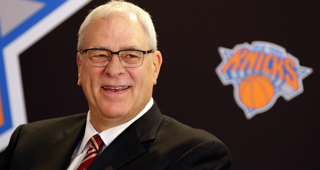When LeBron James and Chris Bosh arrived in Miami in the summer of 2010, beneath the rageful ruckus emanating from northeast Ohio and basketball nerds buzzing about hypothetical title counts, there was speculation as to how long Erik Spoelstra would last as head coach of the newly minted superteam. Some of this was down to Spoelstra’s student-teacher babyface and relative inexperience, but it mostly had to do with the reality that his boss was Pat Riley, who besides being in possession of a certain Irish gangster charisma and five NBA championships as a coach, had taken over for Stan Van Gundy just 21 games into the 2005-06 season, the year in which a young Dwyane Wade and a just-past-his-prime Shaquille O'Neal won their first and only title together.
Everyone involved in that operation claims Van Gundy wasn’t shunted aside by Riley, that Van Gundy had things going on in his personal life that required him to resign, but those protests are broadly disbelieved by fans and the media commentariat. The story goes that Riley wanted greater control over the title contender he had built, so he axed his subordinate and hired himself. For the first season-plus of Miami’s LeBron-Bosh-Wade Era, there were murmurings about Spoelstra suffering a similar fate. In hindsight, those rumors seem to be based more in the precedent set by the Van Gundy quasi-firing than in fact. Throughout LeBron’s stay in Miami, Riley never so much as hinted that Spoelstra’s job was in danger, and Spo eventually grew into a role as a respected collaborator-in-chief with his three stars.
Regardless of the outcome of his decision—which turned out to be the correct one; four Finals appearances and two titles ain’t bad—it would have made perfect sense for Riley to move from the front office to the sideline in the summer of 2010 or 2011. He had assembled a team that was great on talent alone and needed a coach with knowhow and gravitas to help put them over the top. Riley could have provided that; it’s what he amply supplied to the Showtime Lakers and the ‘06 Heat. Ultimately, he pegged Spoelstra as a good tactician who, with Riley’s blessing, would have the necessary authority to command the attention of big-name players. That Riley figured this out on the fly suggests he might be an even better executive than he was a coach.
If Phil Jackson only ever walks up to the edge of calling himself a genius, he certainly enjoys hearing other people call him one. So perhaps someone who fancies himself an extraordinary intellect will appreciate this: sometimes, you have to study history not in order to understand the moment in which you are living, but to understand the gulf between then and now. Were Jackson to—as rumblings suggest he might—install himself as head coach of the New York Knicks, he would be sabotaging his own tenure as team president.
Because the present-day Knicks are not anything like Riley’s title-winning Heat squads, aside from the fact they have a coaching legend in charge of basketball operations. The Knicks are 12 games below .500. They have an aging star in Carmelo Anthony and an emerging one in Kristaps Porzingis. They don’t have any assets enticing enough to trade for Kevin Love or Blake Griffin, and they won’t sign Kevin Durant in the offseason. The Knicks are near the beginning of a rebuild that’s going to take at least another two or three years.
Phil Jackson, as supremely accomplished as he is, can’t give a team in this early stage of its development what it needs. Putting to one side that his bad back that might force him to hand off away games to an assistant, Jackson’s estimable reputation is based on his ability to turn good, veteran teams into champions, not in developing players on rookie contracts, which is the business the Knicks will be in over the coming years. Plus, at 70 years old, it’s hard to imagine Phil putting in a four- or five-season shift on the bench. He can’t plausibly hire himself as a long-term solution.
It’s unclear what Phil makes of all this scuttlebutt, and whether it’s emanating from his people or is just a product of mid-March New York media boredom. He has, after all, still not offloaded Carmelo, which suggests he might not grasp that the Knicks aren’t capable of pulling off a flurry of offseason moves to catapult themselves into title contention. Maybe Jackson thinks he can swing a few deals, dust off the clipboard, and ride a new-look Knicks to the Finals. You never know what sort of delusion lurks in the minds of brilliant, romantic egotists.
Phil’s romanticism is part of what has made him one of the most interesting characters in basketball in addition to one of its most decorated coaches, but to get the job done in New York is going to take clear-eyed pragmatism. If he sees sense, he must know the best thing he can do for the franchise he’s trying to save is bring in a promising young coach—that Luke Walton fellow has an unimpeachable winning percentage—and empower him. That’s what Pat Riley would do. In fact, it’s exactly what Riley did with Spoelstra, before the Heat’s trajectory suddenly changed in the space of a summer. The Knicks won’t be so fortunate; their path to a championship is long and winding, If Jackson understands this, they might yet get there. But if he doesn’t, they’ll lose their way completely.



